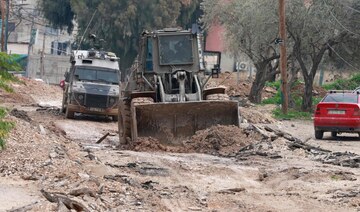BEIRUT: The new sanctions signed by US President Donald Trump against Hezbollah were no surprise for the people of Lebanon, but they are being imposed when Lebanon has been suffering from a government vacuum for five months.
Economist Louis Hobeika told Arab News: “Lebanon was expecting these sanctions, yet the country’s officials did not preempt it by forming a government to deal with this matter.”
“There is neither a government nor an active diplomacy — as if Lebanon was nonexistent,” he said.
Hobeika said: “The sanctions have not been clarified, nor has the Lebanese Embassy in Washington sought to find out their details and explain them to us. Do they include everyone who has business relations with Hezbollah? Will they affect everyone who appears on Hezbollah’s Al-Manar TV?”
Hobeika said that Lebanon as a whole will be affected by the sanctions.
“No area fully belongs to Hezbollah,” he said, “the southern suburb of Beirut is not confined to Hezbollah, so how will the sanctions apply here?”
“I believe it is difficult to punish Hezbollah without punishing all of Lebanon,” Hobeika said. “It is true that Hezbollah’s supporters will be very distressed by the sanctions and might become more loyal to the party, but the issue is a big challenge for Lebanon. If Hezbollah gets the Ministry of Health in the new government, this ministry will deal with all countries, so will the sanctions affect those countries as well?”
Former MP Fares Souaid, member of the anti-Hezbollah meeting of Saydet El-Jabal, told Arab News that the new sanctions are part of a series of sanctions.
“There is a US decision to impose sanctions on Iran and its security and military affiliates, including Hezbollah, and turn the party into a burden on the Lebanese after Hezbollah has come forward as a security guarantee for Lebanon,” he said.
Souaid said the sanctions will distress Hezbollah’s supporters, highlighting that “Hezbollah might be seeking to get the Health Ministry in the new government in order to circumvent the sanctions.”
“Hezbollah is trying, but this will stifle and reflect on Lebanon, and the Lebanese people will pay the price,” he said.
Political activist Ali Al-Amin, the director of Janoubia news website, said: “I have acquainted myself with the sanctions and they target not only Hezbollah, but also its allies and everyone collaborating with it. They are also strict with governments and official bodies.
“My question here is: How will the Syrian regime deal with Hezbollah, which is considered an ally of Syria? And how will the Lebanese government deal with Hezbollah in the future?”
Al-Amin added: “Are these sanctions for implementation? The US president has the power to take action against states and official bodies without consulting with Congress; therefore, this issue will cause chaos and a collapse in Lebanon, and its outcomes will be disastrous.
“Is the purpose of the sanctions to embarrass the Lebanese government and state? In the past, there had been some kind of leniency with previous sanctions and there were efforts to contain them. The current sanctions, on the other hand, are telling the Lebanese that they have to take responsibility.
“These sanctions are serious and affect municipalities with members affiliated with Hezbollah as well as boards of directors.”
Nevertheless, Al-Amin believes those sanctions are discretionary. “If it were up to Trump or the US Treasury to decide who to punish, this means the matter may be subject to a US political balance, so they will either turn a blind eye or make the punishment harsher,” he said.
“This is an additional way to pressure Hezbollah’s allies and the Lebanese, which requires the Lebanese government to first explain the sanctions and then reconsider the state-microstate duality, which must end with these sanctions.”
























